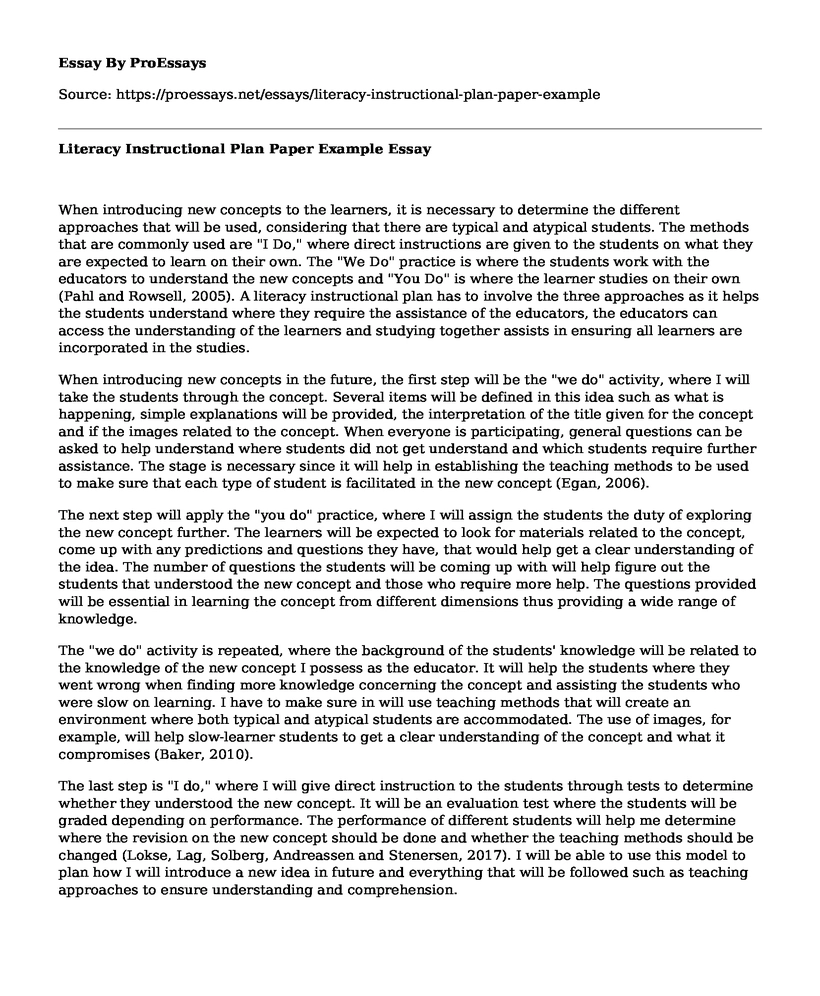When introducing new concepts to the learners, it is necessary to determine the different approaches that will be used, considering that there are typical and atypical students. The methods that are commonly used are "I Do," where direct instructions are given to the students on what they are expected to learn on their own. The "We Do" practice is where the students work with the educators to understand the new concepts and "You Do" is where the learner studies on their own (Pahl and Rowsell, 2005). A literacy instructional plan has to involve the three approaches as it helps the students understand where they require the assistance of the educators, the educators can access the understanding of the learners and studying together assists in ensuring all learners are incorporated in the studies.
When introducing new concepts in the future, the first step will be the "we do" activity, where I will take the students through the concept. Several items will be defined in this idea such as what is happening, simple explanations will be provided, the interpretation of the title given for the concept and if the images related to the concept. When everyone is participating, general questions can be asked to help understand where students did not get understand and which students require further assistance. The stage is necessary since it will help in establishing the teaching methods to be used to make sure that each type of student is facilitated in the new concept (Egan, 2006).
The next step will apply the "you do" practice, where I will assign the students the duty of exploring the new concept further. The learners will be expected to look for materials related to the concept, come up with any predictions and questions they have, that would help get a clear understanding of the idea. The number of questions the students will be coming up with will help figure out the students that understood the new concept and those who require more help. The questions provided will be essential in learning the concept from different dimensions thus providing a wide range of knowledge.
The "we do" activity is repeated, where the background of the students' knowledge will be related to the knowledge of the new concept I possess as the educator. It will help the students where they went wrong when finding more knowledge concerning the concept and assisting the students who were slow on learning. I have to make sure in will use teaching methods that will create an environment where both typical and atypical students are accommodated. The use of images, for example, will help slow-learner students to get a clear understanding of the concept and what it compromises (Baker, 2010).
The last step is "I do," where I will give direct instruction to the students through tests to determine whether they understood the new concept. It will be an evaluation test where the students will be graded depending on performance. The performance of different students will help me determine where the revision on the new concept should be done and whether the teaching methods should be changed (Lokse, Lag, Solberg, Andreassen and Stenersen, 2017). I will be able to use this model to plan how I will introduce a new idea in future and everything that will be followed such as teaching approaches to ensure understanding and comprehension.
References
Baker, E. (2010). New Literacies: Multiple Perspectives on Research and Practice. New York: Guilford Publications.
Egan, K. (2006). Teaching literacy: Engaging the imagination of new readers and writers. Thousand Oaks, Calif: Corwin Press.
Lokse, M., Lag, T., Solberg, M., Andreassen, H. N., &Stenersen, M. (2017). Teaching information literacy in higher education: Effective teaching and active learning.
Pahl, K., &Rowsell, J. (2005). Literacy and education: Understanding the new literacy studies in the classroom. London: Paul Chapman.
Cite this page
Literacy Instructional Plan Paper Example. (2022, Jun 22). Retrieved from https://proessays.net/essays/literacy-instructional-plan-paper-example
If you are the original author of this essay and no longer wish to have it published on the ProEssays website, please click below to request its removal:
- Ancient Greek Values in the Odyssey Essay
- The Partnership of AFL and La Trobe University - Paper Example
- Essay Example on Developing My Mind Through Different Languages
- Essay Example on Othello & Hamlet: Realistic Endings Over Happy Ones
- Essay Example on Lovecraft's Literary Journey: Inner vs Outer Fear
- Paper Example on Setting Up Literacy Stations: Benefits & Guidelines
- Free Essay Example on Learning to Balance Work-Life, School & Family: Overcoming Time Management Obstacles







